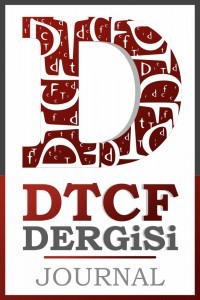“BİYOLOJİK ÇEŞİTLİLİĞE MUTLAK VEDA”: PETER READING'İN -273,15 ADLI ŞİİR KİTABINDA EKOLOJİK YOK OLUŞ VE DENEYSEL ŞİİR BİÇEMİ
Tom Paulin tarafından “yok olan Britanya’nın gayri resmî milli şairi” olarak nitelendirilen Peter Reading (1946-2011), şiir kariyerinin ilk yıllarından itibaren eserlerinde, çevre felaketleri, iklim krizi ve türlerin yok oluşu gibi Antroposen döneme ait temalara yer vermiştir. Reading, 21.yüzyılın başından itibaren yazdığı şiir kitaplarında ise neo-liberal ekonomik sistemlerin ve insan türünün, yaşanan çevre felaketleri üzerindeki olumsuz etkilerini daha güçlü bir sesle eleştirmektedir. Bu çerçevede, Peter Reading’in ölmeden önce yazdığı son iki kitabından biri olan -273,15 [Mutlak Sıfır] başlıklı şiir koleksiyonu, ağıtsal bir ton ve deneysel şiir yöntemlerinin kullanmanın yanı sıra, iklim değişimine bağlı yaşanan çevre felaketleri ve önerilen çözüm önerilerinin ele alınışında hali hazırda kullandığımız dilin ve edebi yöntemlerin yeterliliğini sorgulanmaktadır. Peter Reading’in şiirleri, yaklaşan bir felaketle başa çıkma, kaos ve yok oluş gibi temaları Nuh Tufanı hikayesini yeniden yazarak ele almakla birlikte, farklı şiirsel öğeleri ve dilsel kesitleri harmanlamaktadır. Reading’in kitaplarında sıkça kullandığı sözsel ve görsel kolaj çalışmaları, -273,15 kitabında, Skinner tarafından entropolojik biçem olarak tanımlanan eko-şiir türüne yaklaşmakla birlikte, şair olarak kendi ekolojik duruşunun yetersizliklerini de sorgulamaktadır. Bu çalışma, Lynn Keller’ın eko-şiir alanındaki son çalışmalarında öne sürdüğü “öz bilinçli Antroposen,” (self-conscious Anthropocene) kavramına odaklanarak, Peter Reading’in son dönem şiirlerinde üzerinde durduğu ekolojik tahribatla ilgili kaygılarını, çevre adaleti ve çağdaş şiir biçemleri arasındaki bağı irdelemeyi hedeflemektedir.
Anahtar Kelimeler:
Peter Reading, Öz-bilinçli Antroposen, Ekolojik Kriz, Entropolojik Biçem, İklim Değişimi Yazını
“A PEREMPTORY ADIEU TO BIODIVERSICALS”: ECOLOGICAL DECLINE AND EXPERIMENTATION IN PETER READING’S -273,15
Peter Reading (1946-2011), pronounced as “the unofficial laureate of a decaying nation, Junk Britain” by Tom Paulin, has always been concerned with environmental deterioration, climate change, and decline of the species in many of his work from the 70s onwards. His poems of the new millennium advocate a more robust critique of the neo-liberal economic systems and human beings’ involvement in the current ecological crisis. Reading’s -273,15, [Absolute Zero], revisits his decades-long efforts to experiment with various poetic forms, registers and a grief-stricken tone presiding over most of his previous work with his suspicion of human language to convey the complexities of anthropocenic experience. Reading’s text combines his efforts not only to experiment with various poetic and non-poetic materials, registers, but also look for ways to cope with an approaching catastrophe. The verbal and visual collage pieces as the most frequently employed procedures in Reading’s poetry draw his poetry closer to the ‘entropological register’ Skinner puts forward and bring together the sources to show how Reading’s environmental agenda is conscious of its shortcomings. Drawing on Lynn Keller’s recent work on ecopoetics and the concept of the “self-conscious Anthropocene,” this paper aims to explore how Reading’s ecological agenda and experimental practices in -273,15 might forge an improved understanding of the connections between contemporary poetry and environmental justice.
Keywords:
Peter Reading, Self- conscious Anthropocene, Ecological Crisis, Entropological Ecopoetics, Climate Change Poetics,
___
- Bate, J. (2000). The Song of the Earth. London: Picador.
- Bernstein, C. (2012). The Expanded Field of L=A=N=G=U=A=G=E. J. Bray, A. Gibbons and B. McHale (Eds.), The Routledge Companion to Experimental Literature (p.281-297), New York: Routledge.
- Buell, F. (2004). From Apocalypse to Way of Life: Environmental Crisis in the American Century. New York and London: Routledge.
- “Definition of stet”. Oxford University Press. 14 July 2020. Retrieved from https://www.lexico.com/definition/stet
- Gibbons, A. (2019). Entropology and the end of nature in Lance Olsen's Theories of Forgetting, Textual Practice, 33 (2), 280-299.
- Howe, S. (2003). The Midnight. New York: New Direction.
- Jenkins, A. (1985). Making Nothing Matter: Peter Reading talking to Alan Jenkins. Poetry Review, 75 (1), 5-15.
- Keller, L. (2018). Recomposing Ecopoetics: North American Poetry of the Self-Conscious Anthropocene. Charlottesville: The U. of Virginia P.
- Klawitter, U. (2008). Verbovisual Explorations of Textuality: Peter Reading’s Collection [untitled]. K. Freitag and K. Vester (Eds.), Another Language: Poetic Experiments in Britain and North America (p.187-202), Münster: Lit Verlag.
- Martin, I. (2000). Reading Peter Reading. Newcastle upon Tyne: Bloodaxe.
- Morton, T. (2016). Dark Ecology: For a Logic of Future Coexistence. New York: Columbia University Press.
- Nolan, S. (2015). Unnatural Ecopoetics: Unlikely Spaces in Contemporary Poetry (Doctoral dissertation). University of Nevada, Reno. Retrieved from https://scholarworks.unr.edu/handle/11714/2505?show=full
- Paulin, T. (1988). Peter Reading. Grand Street, 7 (4), 202-11.
- Potts, R. (1990). An Interview with Peter Reading. Oxford Poetry, 5(3), no. pag. http://www.oxfordpoetry.co.uk/texts.php?int=v3_peterreading
- Reading, P. (2005). -273,15. Northumberland: Bloodaxe.
- Reading, P. (2002). Faunal. Northumberland: Bloodaxe.
- Retallack, J. (2003). The Poethical Wager. Berkeley: U of California P.
- Schlutz, A. (2018). Calls in the Desert: Peter Reading’s Climate Change Poetry. ISLE: Interdisciplinary Studies in Literature and Environment, 25 (4), 786–808.
- Skinner, J. (2004/2005). Jonathan Skinner / Statement for “New Nature Writing” Panel at 2005 AWP (Vancouver). ecopoetics 4/5, 127-129.
- Solnick, S. (2017). Poetry and the Anthropocene: Ecology, biology and technology in Contemporary British and Irish Poetry. New York and London: Routledge.
- Tarlo, H. (2009). Recycles: The Eco-Ethical Poetics of Found Text in Contemporary Poetry, Journal of Ecocriticism, 1(2), 114–30.
- Wilson, E. O. (2003). Pheidole in the New World: A Dominant, Hyperdiverse Ant Genus, Band 1. Cambridge: Harvard U.P.
- Yayın Aralığı: Yılda 2 Sayı
- Başlangıç: 1942
- Yayıncı: Ankara Üniversitesi
Sayıdaki Diğer Makaleler
MACKINTOSH'UN MAVİ BİLET ROMANI: ATAERKİL SÖYLEMDE HAPSOLMUŞ “VAHŞİ” KADINLAR
ÇATIŞMA ÇÖZÜM VE MÜZAKERE EĞİTİM PROGRAMLARININ ETKİSİ
TÜRKÇE BOYUT SIFATLARININ ANLAMSAL GÖRÜNÜMLERI: “BÜYÜK” VE “KÜÇÜK”
PATOČKA VE DELEUZE FELSEFESİNDE ASUBJEKTİF VE KİŞİSEL OLMAYAN
ŞİİRİN ÜÇ GÜZELİ: HÜSN-İ MATLAʻ, HÜSN-İ TAHALLÜS, HÜSN-İ MAKTAʻ
ESKİ MEZOPOTAMYA’DA MATEMATİK, GENEL BİR DEĞERLENDİRME
STRATEJİK İLETİŞİM ARACI OLARAK MÜZELERDE INSTAGRAM KULLANIM ANALİZİ: TROYA MÜZESİ ÖRNEĞİ
